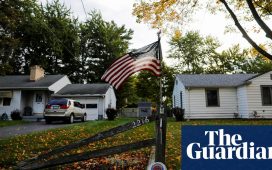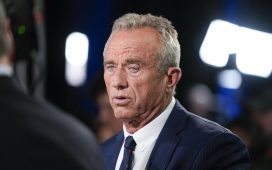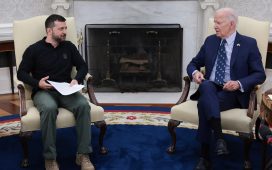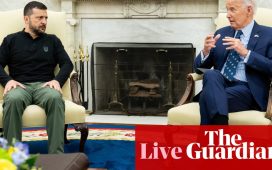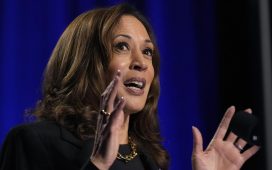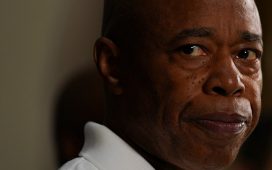When Ohio Senator JD Vance and Minnesota Governor Tim Walz debate next week, you’ll see two Midwesterners painting different pictures of what it means to be from America’s heartland.
MICHEL MARTIN, HOST:
When Ohio Senator JD Vance and Minnesota Governor Tim Walz debate next week, you will see two Midwesterners painting different pictures of what it means to be from America’s Heartland.
(SOUNDBITE OF ARCHIVED RECORDING)
JD VANCE: I grew up in Middletown, Ohio.
(SOUNDBITE OF ARCHIVED RECORDING)
TIM WALZ: Now, I grew up in Butte, Neb.
MARTIN: Both vice presidential picks lean into their Midwest roots and values, as you just heard, but in different ways. Our story comes from someone who is also a Native Midwesterner, NPR’s Asma Khalid.
ASMA KHALID, BYLINE: No one, not even people from the Midwest, really agree on the borders of this sprawling region. It’s farmland in Nebraska, old industrial towns in Ohio and lots in between. But being from the Midwest isn’t just about geography. It’s about mannerisms and language. Oftentimes, it’s welcoming, but sometimes it’s not. And when I hear Vance and Walz speak, it all sounds like home, even though they’re offering different visions of the country. Take a listen to Vance on the economy.
(SOUNDBITE OF ARCHIVED RECORDING)
VANCE: America’s ruling class wrote the checks. Communities like mine paid the price. For decades, that divide between the few with their power and comfort in Washington and the rest of us only widened.
KHALID: And here’s Walz on abortion.
(SOUNDBITE OF ARCHIVED RECORDING)
WALZ: Because in Minnesota, we respect our neighbors and the personal choices they make.
(CHEERING)
WALZ: And even if we wouldn’t make those same choices for ourselves, we’ve got a golden rule – mind your own damn business.
KHALID: I talked about this all with the former governor of Indiana, Mitch Daniels, a Republican. Daniels sees a big difference between the progressivism of Minnesota and the conservatism of southern Ohio.
MITCH DANIELS: But I don’t think they’re speaking the same language at all.
KHALID: But channeling Midwestern values is a way to bridge that.
DANIELS: Sending signals that I’m not one of those folks who really looks down his nose at you is important.
KHALID: And Daniels sees Walz’s folksiness as a savvy political move to reassure voters concerned about Democrats’ plans for the economy.
DANIELS: It’s very common for political candidates to try to neutralize their problems. And the problem if you’re a hard-left Democrat is that in this year, of course, is that your economics have not worked too well in the Midwest.
KHALID: But fellow Hoosier, Pete Buttigieg, a Democrat, who was the former mayor of South Bend, Ind., had a different view. He spoke to me in his personal capacity. He sees Walz as someone who can make democratic policies relatable to the heartland.
PETE BUTTIGIEG: When he talks about things like making sure all the kids in public school in Minnesota can eat, I think, in the past, something like that actually would have been derided as some kind of coastal liberal dream, when, actually, it’s viewed in the Midwest as a commonsensical policy.
KHALID: And full disclosure, Buttigieg is playing the role of JD Vance in debate practice with Walz. Walz and Vance do share some mannerisms. Sometimes they put their hand over their heart. Walz talks about voters as neighbors. Vance has called them friends. Both speak about their military service. But beneath that aw-shucks persona, they can also be combative. Here’s the Minnesota governor again.
(SOUNDBITE OF ARCHIVED RECORDING)
WALZ: Like all regular people I grew up with in the heartland, JD studied at Yale, had his career funded by Silicon Valley billionaires and then wrote a best seller trashing that community – come on. That’s not what middle America is.
KHALID: This isn’t just about throwing a political punch, according to Britt Halvorson. She says both candidates are trying to prove that they are more authentically Midwestern. She’s a cultural anthropologist who wrote a book called “Imagining The Heartland.”
BRITT HALVORSON: There’s this work at play of kind of trying to dislocate the other from the Midwest and say that the other is a coastal elite in disguise or a stealth elite in disguise.
KHALID: She says they’re both trying to make voters feel at home comfortable with their campaigns as they try to win key states in the region, like Wisconsin and Michigan. Here was Vance this week in Traverse City.
(SOUNDBITE OF ARCHIVED RECORDING)
VANCE: And Kamala Harris, you want a promotion, but the message from Michigan is you’re fired. Go back to San Francisco, where you belong.
KHALID: This weekend, it’s Walz sending a message from Michigan. The former high school football coach is once again leveraging his Midwestern persona. He’ll be campaigning at the University of Michigan football game.
Asma Khalid, NPR News.
Copyright © 2024 NPR. All rights reserved. Visit our website terms of use and permissions pages at www.npr.org for further information.
NPR transcripts are created on a rush deadline by an NPR contractor. This text may not be in its final form and may be updated or revised in the future. Accuracy and availability may vary. The authoritative record of NPR’s programming is the audio record.
